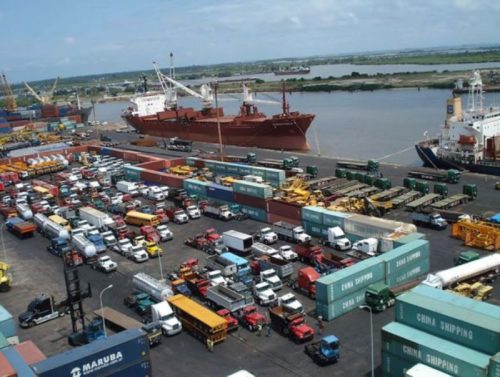
The world over, ports are regarded and treated as critical infrastructure. They are more or less the life-wire of world economy hence they are treated with utmost respect. Even in this trying time when coronavirus (COVID-19) is ravaging the economic and social life of nations, both big and small, forcing the closure of other important infrastructures, the seaports are left to operate in recognition of their indispensability to the survival of the people.
It is against this backdrop that it is gratifying to note that while taking several drastic measures in the ongoing battle against the COVID-19 pandemic, the Federal Government sees the seaports as a critical infrastructure that must remain open all the times. The government, like other governments of the world, is fully aware that the closure of the ports means the total shut down of the economy –a situation that is very difficult to recover from. Government also recognizes that some of the inputs necessary to fight the pandemic can only reach the country through the seaports.
Unfortunately, the expected benefits of keeping the ports open are being threatened by the inability of importers and agents to clear and take delivery of their consignments. As a result, imported goods are not exiting the ports promptly, leading to a build-up of cargoes at the terminals. The overall effect is that the ports that were already congested before the outbreak of the COVID-19 pandemic are now being threatened with the worst kind of congestion that will take the nation enormous time and resources to recover from.
According to the Seaports Terminal Operators Association of Nigeria (STOAN), all the port terminals are 90 per cent to 95 per cent full, warning that “If cargo doesn’t flow out within days, there will be no space in the terminals to discharge other in coming cargo.” Notably, some of the cargoes waiting to be discharged include food and medicine which the country is in dire need of at this time.
To avert the looming congestion, STOAN has appealed to importers to pick up their cargo and refrain from returning empty containers for the next two weeks in order to allow the operators to prioritize the incoming imports. “If consignees do not remove their cargo in the next couple of days, the ports will become fully congested and it will be near impossible to discharge incoming vessels,” the association warned in a press statement it issued last week.
In addition, STOAN stressed the need for operational continuity at the port as this is vital to the nation’s fight against the coronavirus disease, observing that “the only way to ensure that the country does not run short of vital supplies including food, medicaments, hand sanitizers and nose masks, which are essential kits in curtailing the spread of the deadly virus is to keep the ports working.
“This is why everyone involved in the cargo release process and the logistics chain must sacrifice personal interests at this time for the national good,” it stated.
While we join the terminal operators in appealing to importers and agents to take prompt delivery of their consignments, we appeal to all the organizations and government agencies involved in the cargo clearance process to discharge their duties with a high degree of patriotism and in a manner that does not hinder trade. The banks must also live up to expectations and play their roles effectively in the clearance process. In recognition of their important roles in goods clearance and in the lives of the citizens, government exempted them from the lockdown of the cities and states in the fight against COVID-19. It is, therefore, uncharitable for some of them to shut their doors against customers, especially importers and clearing agents who need their services in order to clear their goods from Customs control.
The Nigeria Customs Service, like the terminal operators, has kept its doors open for usual business operations. However, it is regrettable that the attitude of some officers and men of the Service, to a large extent, still constitute an obstacle to free movement of cargoes out of the ports. After a tardy and painful goods clearance process, Customs officials still conduct another examination at the port exit gate. This check results in long truck queues and snail-speed exit of the trucks out of the ports.
On the whole, there are three layers of checks by Customs on the same goods. Cargoes are checked inside the terminal, at the port exit gate and on Wharf Road. This is really unacceptable, as it impacts negatively on the ease of doing business at the port. For whatever reason, cleared cargoes should not be subjected to another round of checks at the exit gate. Customs management should, therefore, reduce these checks and help the government and port users in the efforts to facilitate trade.
The multiplicity of government agencies at the port and the port exit gates is another issue that must be addressed. Despite the reduction of government agencies some years ago, there are still too many government agencies involved in the cargo release process, all of them working at cross-purposes, and marring government policy of ease of doing business. Some of them, like the Customs, insist on conducting another round of checks at the port gate after the goods have been cleared at the terminal.
To realize government objective of keeping the ports open, government agencies must allow goods to move freely out of the ports and within the country. Law enforcement agents on the highways should not act beyond their briefs by stopping vehicles conveying cleared goods from the ports to their various destinations. The lockdown and inter-state border restrictions should not affect the movement of cargoes, so as not to rubbish the government directive of keeping the ports open.
Copyright Ships & Ports Ltd. Permission to use quotations from this article is granted subject to appropriate credit given to www.shipsandports.com.ng as the source.